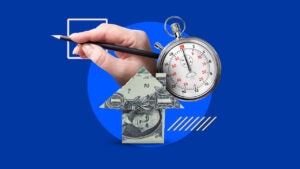Does a HELOC affect your credit score?




Key takeaways
- HELOC applications require a hard credit pull, which temporarily lowers your credit score.
- Depending on how your lender reports it to credit bureaus, carrying a large balance and closing a HELOC can also ding your credit score.
- On the plus side, using HELOC funds to pay off other, higher-interest debts can improve your credit score, and timely HELOC payments strengthen your credit history.
A home equity line of credit (HELOC) can be a key source of cash. But before applying for one, you might wonder: Does a HELOC affect your credit score? After all, most loans and debts do.
The short answer? Yes, it can, both positively and negatively. A HELOC’s impact on your credit score usually comes down to two things: how your lender reports it to the credit bureau and how you manage the account. “If you keep your balance low and make your payments on time, it can help your credit score,” Linda Bell, senior writer on Bankrate’s Home Lending team, explains. “But if you max out the amount you can draw out or miss payments, it can have a negative effect.”
Let’s look at how HELOCs impact your credit history, from beginning (applying for one) to middle (holding one) to end (closing one).
How applying for a HELOC affects your credit
When you apply for a HELOC, the lender will check your credit score. This “hard pull” or “hard check” has the potential to temporarily lower that three-digit number. “The inquiry will remain on your credit report for two years, but generally only impacts your credit score for about six months,” says Jackie Boies, senior director, Housing Services at Money Management International, a Texas-based nonprofit debt counseling organization.
If you haven’t applied for another loan or a credit card recently, the difference in your score should be small. “Overall, a single inquiry for credit will have minimal impact, typically five to 10 points,” says Suzanne Mink, retired vice president of consumer lending at Connex Credit Union.
Multiple inquiries from auto, mortgage or student-loan lenders within a short time period (usually, up to 45 days) don’t have multiple impacts on a credit score. Credit bureaus group them together, considering them as a single loan application (after all, you’re probably not buying more than one house or going to two colleges at the same time). However, if you solicit offers from several lenders over a longer period of time, or apply simultaneously for a lot of credit cards or store accounts, it does count as separate hard inquiries. A number of these could lower your credit score.
How using a HELOC affects your credit
Does a HELOC affect your credit score after you open and start drawing on it? It depends on how the lender classifies it.
The HELOC can be reported to credit bureaus in one of two ways: as an installment loan (i.e., a second mortgage) or as a revolving account like a credit card (reflecting the fact that you can borrow money against your credit limit and can make only minimum payments). If the HELOC is reported as a revolving account, the amount you withdraw could affect your credit utilization ratio (see below). If it’s classified as an installment loan, it won’t.
However it’s reported, your outstanding HELOC balance will show up under overall “amounts owed” on your credit report, which lenders and creditors use to determine your total amount of debt. A large amount of debt can ding your credit score.
Credit history/credit mix
While the amount of money owed makes up the biggest piece of your FICO credit score (30 percent), the calculation looks at other factors, too. So, how does a HELOC affect your credit score in those other areas? Let’s look at two of note:
- Length of credit history (15 percent): Financial institutions want to know that you have a proven track record of managing your money well. If you’ve had credit available to you for a long period of time and you’ve done a good job with it, that helps your credit score. Opening a new line of credit reduces the average age of your accounts, which can hurt your credit score.
- Credit mix (10 percent): A strong borrower manages a mix of credit types well. Having a variety helps your score. You might want to find out how the lender plans to report your HELOC so you can plan accordingly. If you already have an installment loan in the form of a mortgage, it’s generally better if they report it as a revolving credit account. That said, if you’ve got a lot of credit cards, it might help your mix more to have the HELOC reported as an installment loan.
What happens to your score if you don’t use the HELOC?
One factor in determining your credit score is how much of your total available credit — across all your cards and credit lines — you’ve used, known as the credit utilization ratio. The lower the ratio, expressed as a percentage, the better your score.
However, HELOCs are an exception. Because they are secured debt (using your home as collateral), FICO doesn’t consider your HELOC utilization when it’s calculating your score, though other measures, like Vantage Scores, might. So you don’t get points for not tapping the HELOC balance, and you’re not penalized for maxing it out. In contrast, with a credit card, it’s recommended to not use more than one-third of your limit.
Because of this feature, some homeowners open HELOCs and just keep them for a rainy day (as opposed to using them for an immediate purpose). If an unexpected expense pops up, they then tap it, arguably a better move than dipping into savings or charging it on a card, which could negatively impact the credit utilization ratio.
Source: Mortgage Bankers Association's 2025 Home Equity Lending Study
How a HELOC can improve your credit score
Treated well, a HELOC can burnish your financial profile and your creditworthiness, in several ways:
- Build a credit history: If you don’t have a lot of credit accounts, a HELOC will help establish your credit history and give other lenders more confidence in your ability to repay what you borrow. Home-secured debt tends to be seen as “good debt” by credit agencies. Because your HELOC is tied to an asset that enhances your net worth, borrowing against your home is often better than taking out a credit card or personal loan as far as your credit score is concerned.
- Strengthen your record: If you pay your HELOC faithfully each month, you establish a record of on-time payments, a key component of your credit score.
- Lower your credit utilization ratio: Ideally, you want to keep this ratio below 30 percent. Your HELOC can help here. FICO specifically excludes HELOCs when calculating credit utilization ratios, remember — whereas credit cards definitely do count towards them. So using HELOC funds to settle card balances effectively wipes that debt off the record, so to speak, lowering your credit utilization ratio. And since the ratio accounts for one-third of your credit score, a drop can give your score a notable bump up.
How closing a HELOC affects your credit
While the size of your HELOC balance may not affect your credit score all that much, the presence of the balance itself does.
Specifically, closing a HELOC can impact your credit score negatively. It can hurt your credit mix if it was one of your only installment loans or revolving credit accounts (depending on how your lender was reporting it).
The impact to a credit score will be greater if you have a short or new credit history or few credit cards. “Credit history makes up about 15 percent of your score,” says Mink. “A longer credit history will help to improve your score.” Each month you keep the HELOC open extends that history.
By managing your HELOC wisely, you can prevent any negative impact on your credit score.— Linda Bell, Senior Writer, Bankrate
How to safeguard your credit score when opening a HELOC
Establishing your HELOC could initially lower your credit score, as the addition of any new debt to your record would. And missing HELOC payments will definitely ding your score.
However, here are some ways to mitigate any potential damage to your credit when you open a HELOC:
- Resolve other debts. Several open credit accounts with high balances can negatively impact your credit utilization ratio, which will ultimately bring down your credit score. Try to pay down other debt before taking out a HELOC.
- Shop rates and get quotes from different lenders within a window. FICO considers similar inquiries that have occurred within a month or so of each other as a single inquiry. This time period might vary depending on the credit scoring model used, but it’s typically between 14 and 45 days.
- Make timely HELOC payments. A missed payment on your HELOC is likely to cause your credit score to drop. So would a payment for less than the minimum. Depending on your lender, there might be a grace period before it’s reported to the credit bureaus. The reverse is also true: You can boost your credit score by making timely payments toward your HELOC.
“When using a HELOC, planning is key,” Bell advises. “Start by figuring out exactly what you need and set a budget to avoid overspending. Only borrow what you can comfortably repay, keeping in mind that HELOC interest rates can change. By managing your HELOC wisely, you can prevent any negative impact on your credit score.”
And, Boies adds, “As with all debt, it will be very important to maintain timely payments and develop an excellent payment history on your HELOC.”
FAQ about HELOCs
Why we ask for feedback Your feedback helps us improve our content and services. It takes less than a minute to complete.
Your responses are anonymous and will only be used for improving our website.







